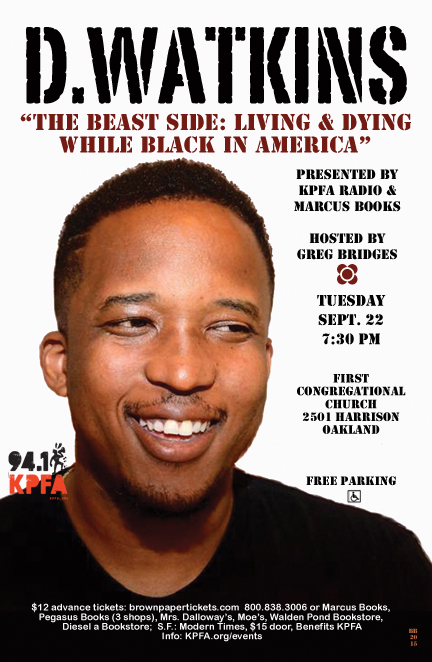KPFA Radio 94.1FM and Marcus Books presents:
 Tuesday, September 22, 7:30 PM (wheelchair access)
Tuesday, September 22, 7:30 PM (wheelchair access)
First Congregational Church, 2501 Harrison Street, Oakland
$12 advance tickets: brownpapertickets.com :: 800-838-3006 or Pegasus (3 sites), Marcus Books, Moe’s, Walden Pond Bookstore, Diesel a Bookstore, Mrs. Dalloway’s SF: Modern Times, $15 door
In The Interesting Narrative of the Life of Olaudah Equiano, first published in 1789, freedman Equiano chronicled his journey into and out of slavery. Ever since, African-Americans have documented the long economic, psychological, and cultural shadow of being imported like commodities to this country. Their works stretch from Booker T. Washington’s Up from Slavery to Richard Wright’s Black Boy and John Edgar Wideman’s Brothers and Keepers, to James Baldwin to Barack Obama’s Dreams From My Father and Ta-Nehisi Coates’ famous “Letter to My Son”and “Between the World and Me.”
Now we add to that impressive list D. Watkins’ potent “The Beast Side: Living and Dying While Black in America.” Very recently his “Too Poor for Pop Culture” essay went viral almost immediately after it appeared on the website Salon. It’s a vivid meditation about how little pop culture matters to the people who live paycheck to paycheck. Two more essays followed—”How Glamorizing Drugs Is Killing Black Kids” and “Poor Black People Don’t Work? Lessons of a Former Dope Dealer.” Thousands eagerly shared and tweeted them. He has since been a frequent guest on NPR and been published in The Huffington Post, Aeon, Vice and Salon.
In short, Watkins is writing a perennial American dream narrative, an intimate saga of overcoming adversity. And he’s doing it after that dream has long since vanished, when the American narrative for most people isn’t a triumph over adversity but a steady struggle to simply get by. And he’s doing it as somebody straddling two worlds. He’s writing about the underemployed, the undereducated, the people who only appear in the newspaper in crime blotters or homicide reports. And he’s doing it in stories riddled with pride, style, and wit.
“I didn’t break bad,” Watkins says. “There was a time when I was a kid when I thought selling drugs was legal. It looked legal. I had an extremely flawed mentality, but if that didn’t happen I probably wouldn’t be doing what I’m doing today.”
Watkins is still fighting his way out of where he came from. He is no longer selling cocaine and heroin. He has earned two graduate degrees. What sets his writing apart is his own fierce contemporary class consciousness, coming from the perspective of somebody who didn’t just come from little. He’s still there. Growing up in East Baltimore (where The Wire was made), when his brother’s drug selling got him killed, D. Watkins took on the work, and put himself through Johns Hopkins University while dealing . What makes Watkins’ story sting is that it isn’t simply a journey of a young black man away from drug dealing; it’s the more pressing story of a member of the underclass wanting to be recognized as human.
View D. Watkins interview on Meet the Press at: http://hotbookspress.com/
“D. Watkins has emerged as a powerful new voice just when America needs to hear his message.
It’s the voice of all those in Baltimore, Ferguson, Charleston, Oakland, New York, Cleveland, and wherever another innocent life is lost. We all need to listen to what he has to say!”
—Touré, writer and MSNBC host.
Greg Bridges is a radio dj and journalist living in Oakland. He can be heard over KCSM 91.1fm (www.kcsm.org) Tuesday nights 6 to 9 pm, and Thursday nights 6 pm to 2 am, on KPFA (94.1fm) Monday nights 8 to 10 pm. He is a contributor to KPFA’s Hip Hop and social affairs show HardKnock Radio. Greg has written for various publications including Jazz Now Magazine and Bayshore Magazine.
KPFA benefit

